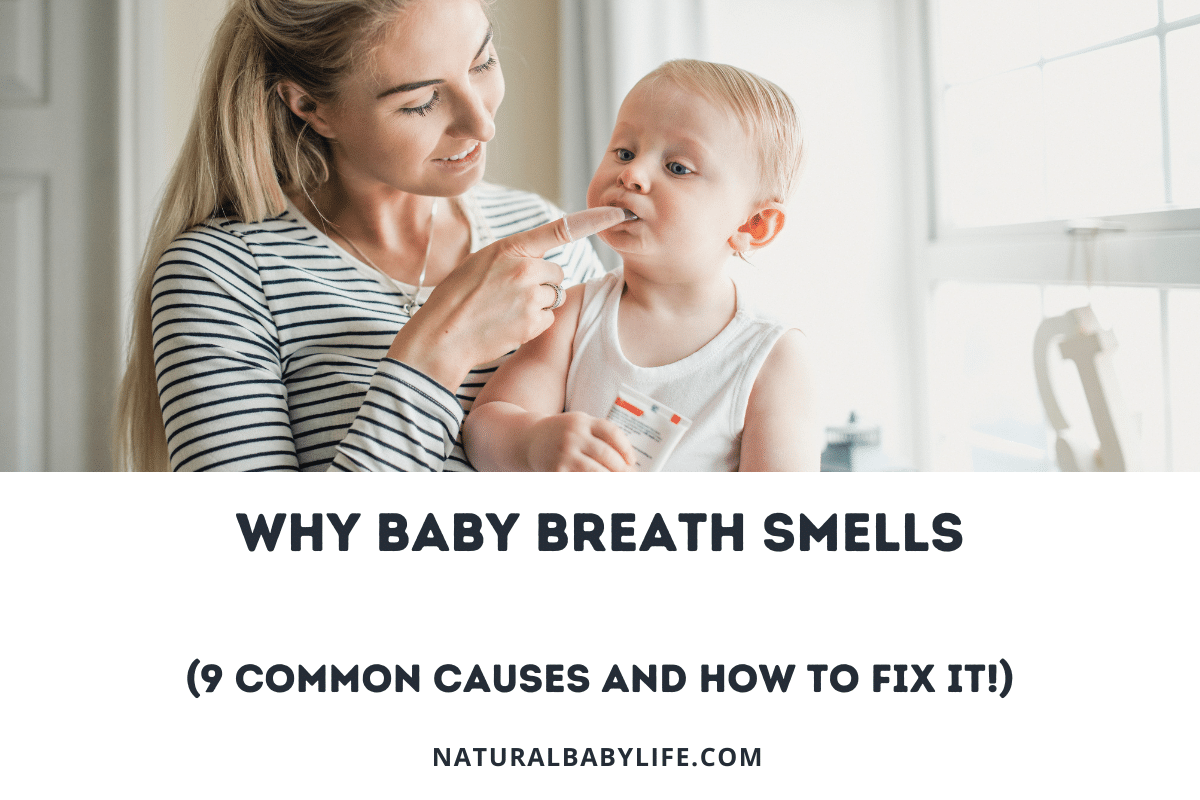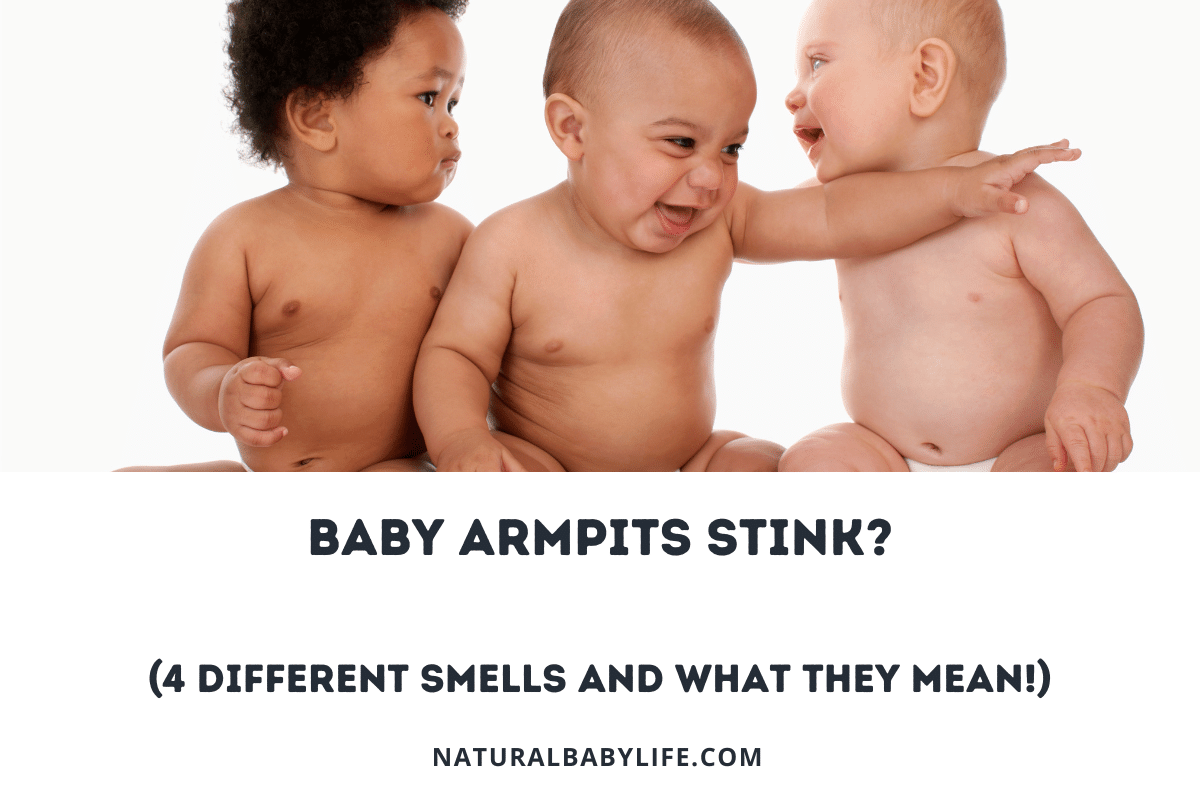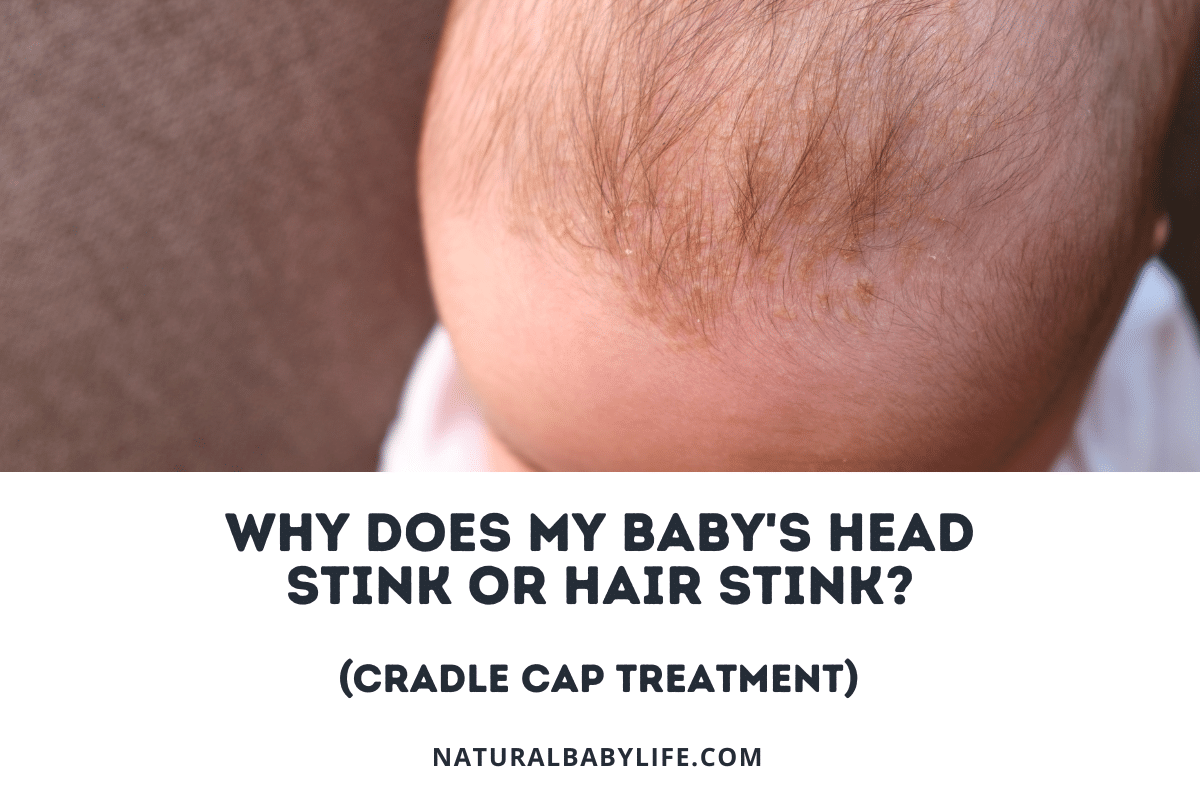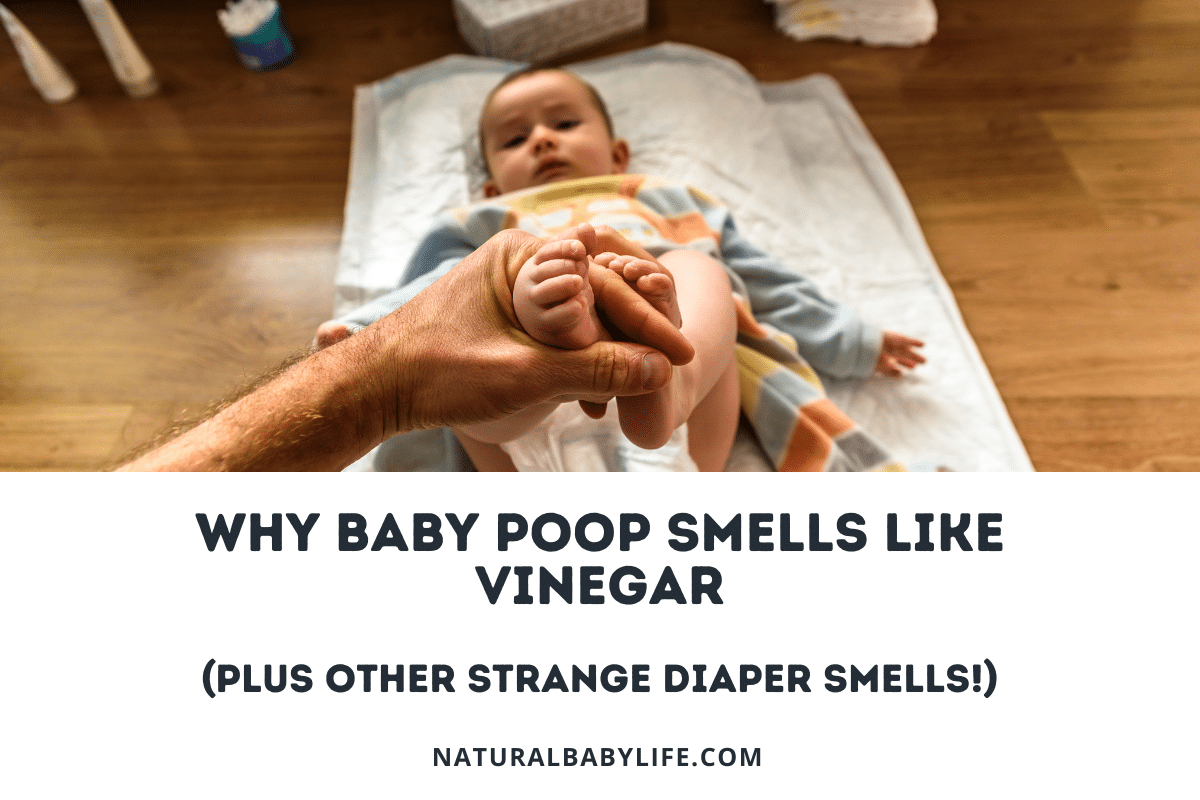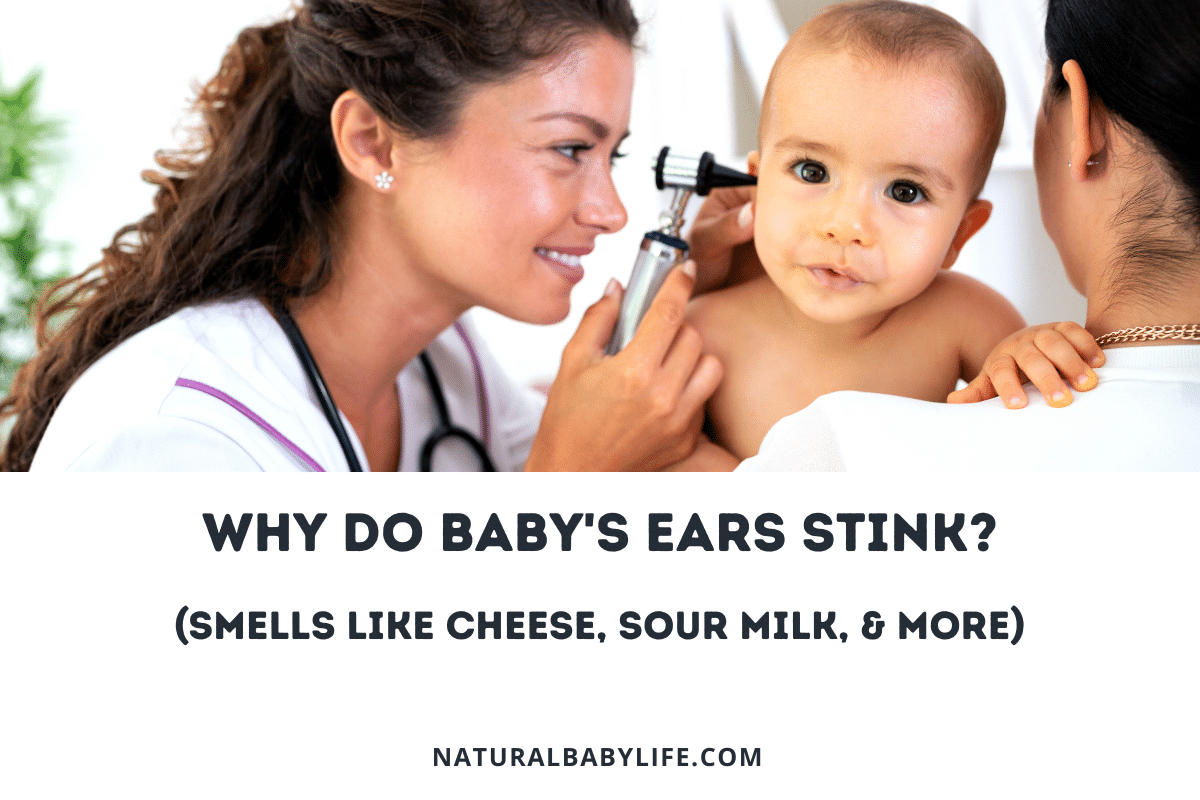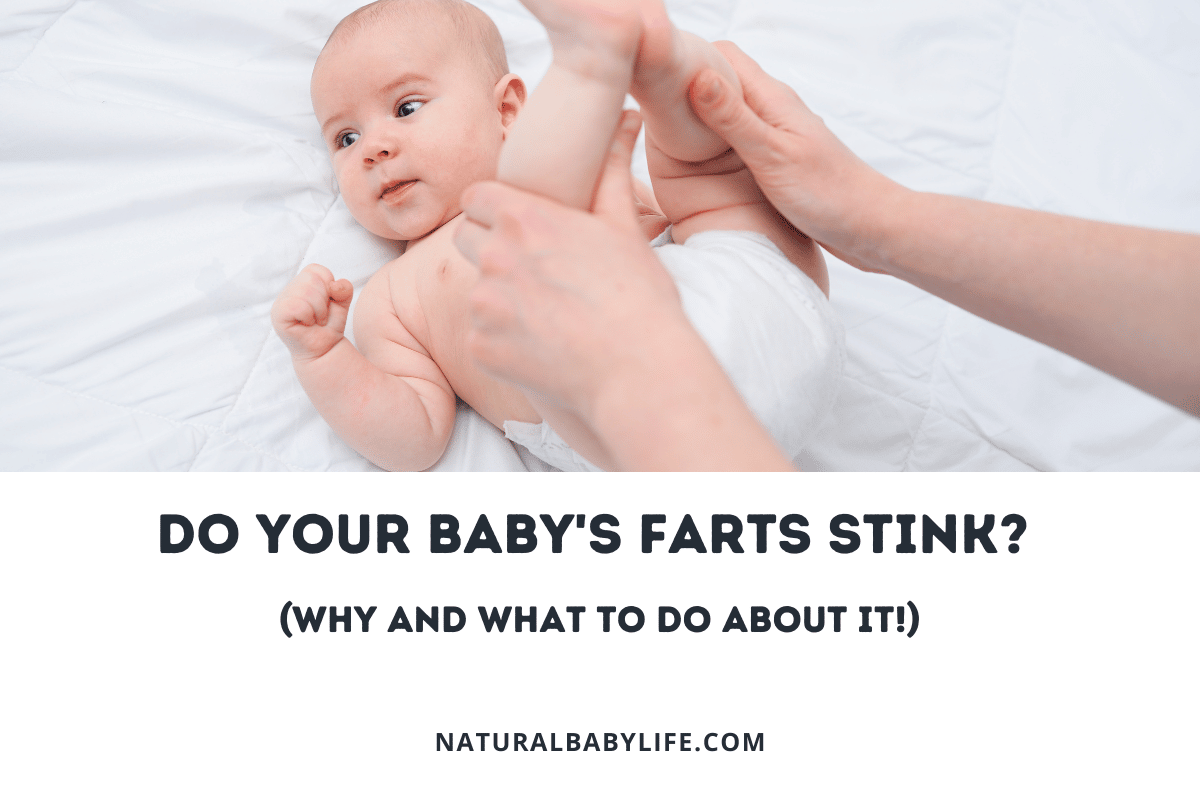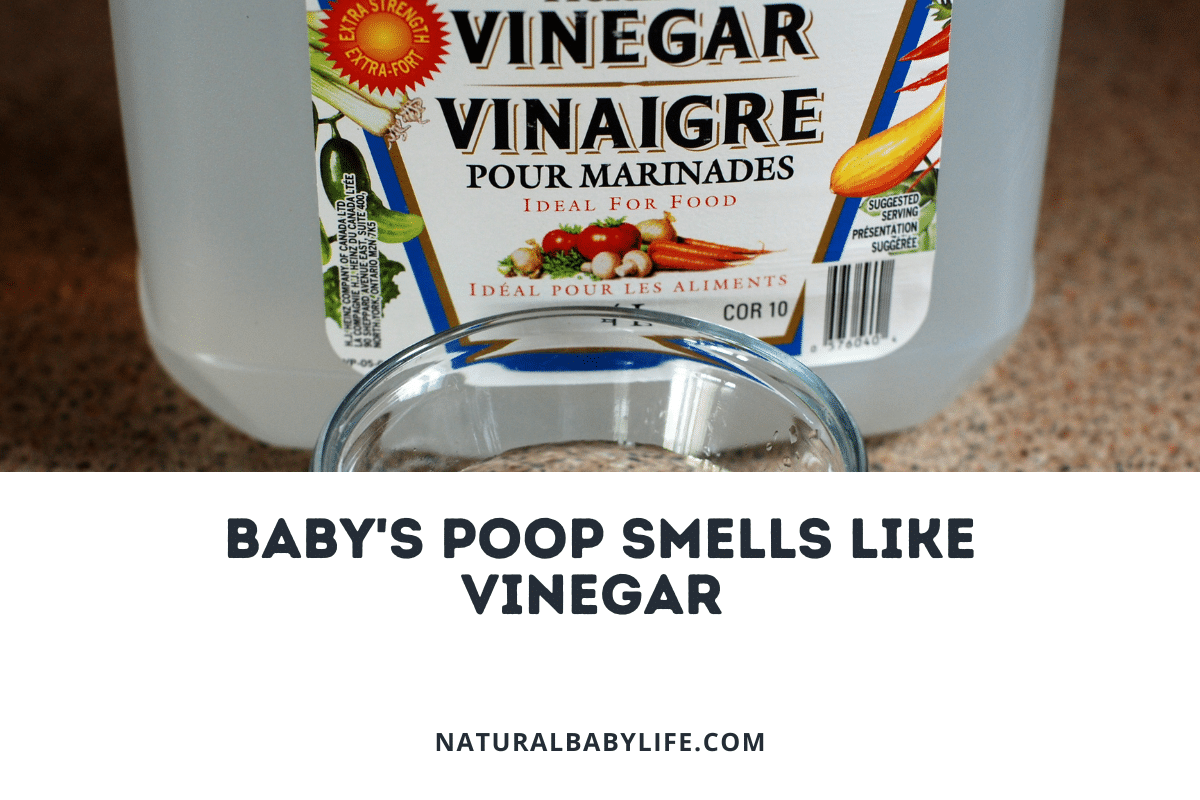When you think of babies one thing that comes to mind is smells–both the good and the bad. One smell you probably don’t associate with babies is bad breath. As surprising as it may be, babies can get bad breath and just like adults, lots of things can cause your sweet baby’s breath to stink.
There are many reasons why your baby’s breath might smell off. Most causes are treatable like pacifier use, diet, and oral hygiene. However, on rare occasions, it could be linked to a serious health condition. It’s important to care for your baby’s oral hygiene, but sometimes bad breath is a sign of a deeper issue.
Sometimes your baby’s oral health issues, like bad breath, can be a symptom of a larger health problem affecting the body. If you already practice routine oral care but your baby still has bad breath, it may be time to begin exploring other potential causes of this pesky problem.
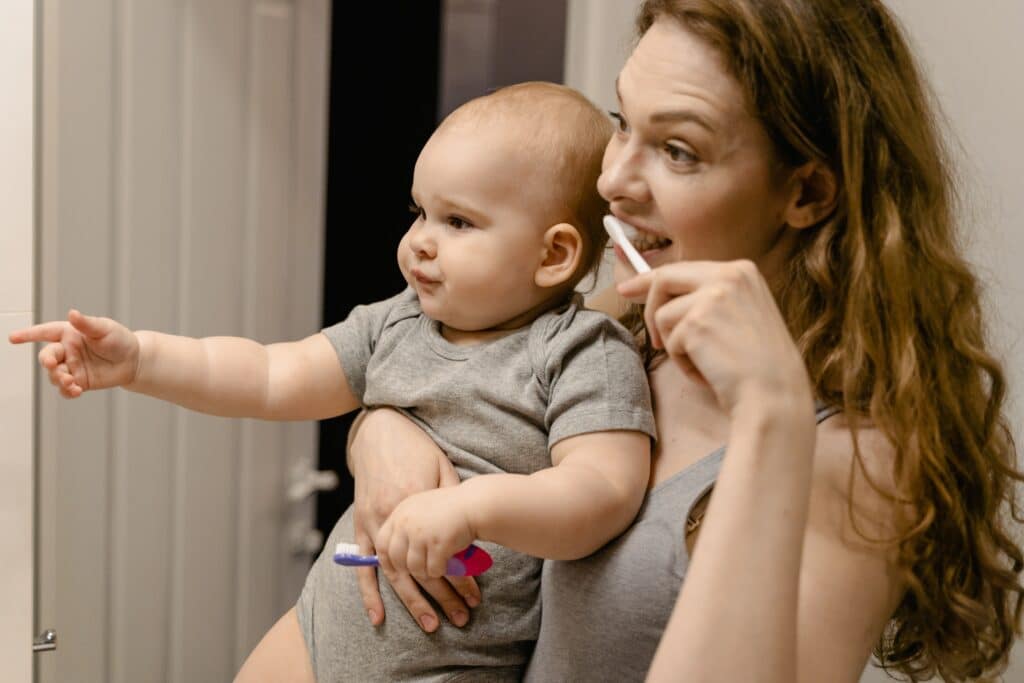
Table of Contents
Why baby breath smells
Just like adults, babies sometimes struggle with bad breath and most of the time, it’s completely normal. A baby’s diet, oral hygiene routine, and pacifier use can all contribute to the way their breath smells.
While these things are easy to address, there can also be a more serious issue going on. For this reason, it makes sense to address any strange smells coming from your baby’s mouth and involve a doctor if it doesn’t go away with changes to your baby’s routine.
With that in mind, let’s look at some of the most common bad baby breath smells, what causes them, and what to do about it!
Sour
Because most babies are on a strict diet of milk or formula only for the first 4-6 months of life, it’s not uncommon for their spit up or burps to have a sour milk smell. However, if this sour milk smell is something that is consistent and accompanied by other troublesome symptoms, then it may be time to look at other factors or signs that the sour breath is being caused by an undiagnosed health condition.
Some babies can experience acid reflux (gastrointestinal reflux), which can be tricky to identify. Reflux occurs when the contents of the stomach (in baby’s case, milk, or formula) back up into the esophagus.
Babies who have reflux may also experience crying or fussiness during and after feeding, excessive or forceful spit up or vomiting, refusing to eat, crying or arching when placed on their back after feeding, and even weight loss.
Luckily, most babies will outgrow this condition. However, it can be painful and bothersome, so if your baby has sour breath combined with other symptoms, speak with your pediatrician about infant acid reflux to rule out this as a possibility.
Sweet
While most of us wouldn’t think sweet-smelling breath to be a problem, sometimes it can be an indication something is wrong.
Type 1 Diabetes is a condition affecting the autoimmune system in which the pancreas produces little or none of the hormone insulin, which is critical in breaking down food properly.
Diagnosing diabetes in babies and young children can be difficult. Some early warning signs may include sweet-smelling breath (caused by the body’s inability to excrete sugar properly within the body), fatigue, yeast infections in the mouth or diaper area, behavioral changes, and sugar in the urine.
With no family history of Type 1 Diabetes, the occurrence is .3% in the general population, so it’s not likely that this is the case for your little one. However, it’s best to check in with your pediatrician if you notice baby has a fruity or candy smell to their breath so they can assess your child and rule out any serious causes.
Vinegar
Vinegar has its uses around the house and in the kitchen, however, one place you don’t expect vinegar is in your baby’s mouth. If baby smells of vinegar the first remedy is to try wiping baby’s face, neck, behind the ears.
Sometimes a baby can spit up while they’re sleeping or playing, and the vinegar smell can be caused by sour milk that’s trapped in their skin, clothes, or bib.
If cleaning and changing baby doesn’t do the trick and you find the vinegar smell is coming from their mouth, then you may want to discuss other causes with your pediatrician. GERD, or gastroesophageal reflux disease, and even acid reflux can sometimes be the cause of sour or vinegar breath in babies.
If the sour or vinegar breath is accompanied by other symptoms like colicky behavior, gas, and vomiting then it’s time for a trip to the doctor to rule out conditions like GERD or acid reflux.
Vomit
It’s not uncommon for a baby’s breath to smell like vomit now and again. After all, babies do frequently spit up or vomit due to their gastrointestinal system developing after they’re born. Most of the time, spitting up or vomiting after meals is nothing to worry about and the baby will outgrow this issue generally by 12 months.
If breath that smells sour or vomit-like is a constant problem not relieved over time, you should be on the lookout for other signs that your baby has a digestive or dietary issue that needs attention. Sometimes, babies who vomit forcefully or often after meals can experience acid reflux or GERD and should be seen by a pediatrician.
GERD and acid reflux can also cause a baby to be fussy or colicky, gassy, fussy during or after feeding. They also may have trouble sleeping.
Cheese
If baby’s breath smells like cheese, it’s good to eliminate the possibility that it could actually be your baby herself that has a cheese-like odor. Be sure to give baby a good wash or wipe and change their clothes and bib. Those cute folds in baby’s skin can trap breastmilk or formula that, after a while, could cause your baby to stink like cheese.
If baby’s skin and clothing are not the offenders and the odor is coming from their mouth, consider the cheese-like, sour odor might simply be due to formula or breastmilk. However, consistent bad breath with a sour or cheesy odor can be a sign of oral thrush, which is a very common yeast overgrowth condition in babies. Thrush needs to be diagnosed by a doctor but can be treated with medication.
If baby’s bad breath is accompanied by white patches on the tongue or cheeks or poor feeding, then a quick trip to the doc can assess if they have thrush.
Metal
Metal mouth is usually a term reserved for those wearing braces, but since babies generally don’t have a ton of teeth, metal mouth could mean something else.
If your baby’s breath has taken on a metallic smell, you may want to ensure the baby is not ill or dehydrated since this is a common symptom for those suffering from sickness or dry mouth. Be sure to check that baby doesn’t have any abrasions inside their mouth as well, like a cut or blister, since blood has a metallic odor.
If the metallic smell persists despite a good oral health routine, then a call to the pediatrician should be your next step. While this is usually a symptom of something common, like illness or dry mouth, it can also indicate other conditions like acid reflux, GERD, or respiratory infections.
Garlic
Even if baby isn’t gnawing on garlic bread yet, it’s possible for some of the flavors you eat to make their way into breastmilk. So that big pasta dinner you enjoyed might be enjoyed by baby later causing a faint garlic odor on baby’s skin or breath.
If baby is beginning to eat solids this could simply be a case of a pungent food causing some funky or garlicky breath. Grab the toothbrush and be sure to care for the baby’s gums and tongue in addition to their teeth. However, this won’t alleviate the smell immediately, so simply waiting it out is part of the remedy here.
Poop
If baby’s breath has taken on a fecal odor there are several causes to consider here.
Firstly, good oral hygiene practices should be followed to prevent the buildup of odor-causing bacteria. For babies without teeth simply wiping gums and tongue with a clean wet cloth after feedings should prevent offensive odors.
For older kids, brushing twice daily and flossing should be part of your daily routine to prevent bad breath and other oral health conditions. If you’ve been practicing good oral care, then there may be another cause for the bad baby breath smells.
Sometimes, pacifiers or thumb sucking can lead to bad breath due to bacteria being introduced to the mouth. Be sure baby’s hands, pacifiers, and teething toys are cleaned often.
A visit to your pediatrician can help rule out common illnesses, like a respiratory infection, sore throat, or a common cold. More serious conditions associated with fecal breath can be a dental abscess or other oral infection, a symptom of prolonged vomiting, or a bowel obstruction.
Fish
If baby’s breath has a fishy odor, sometimes described as an ammonia smell or even urine, and it’s not alleviated by brushing or cleaning their mouth and face, then a call to your doctor should be your next step. Breath that smells like fish could indicate a serious liver or kidney condition.

How do I get rid of my baby’s bad breath?
In most cases, routine oral care is the answer for preventing bad breath in babies and adults alike. Proper dental care and oral health begins before baby’s first tooth appears. According to the American Academy of Pediatrics, you should start caring for baby’s oral health before they even start teething.
To prevent oral health complications, like occasional bad breath and early tooth decay in infants, the following steps are recommended to keep baby’s mouth and teeth healthy:
- Before baby’s teeth erupt, you can clear away harmful bacteria by rubbing a clean, wet washcloth over their gums after each feeding or use an infant toothbrush with water to do the same.
- When baby’s first teeth appear, begin using a small amount of infant toothpaste (about the size of a grain of rice) and an infant toothbrush to begin brushing baby’s teeth and gums twice daily. Speak with your pediatrician or a pediatric dentist about using fluoride.
- As your baby gets more teeth, continue to practice routine dental care to include flossing and practice spitting to prevent swallowing toothpaste.
- As your baby becomes a toddler, continue to brush their teeth or closely monitor their teeth brushing to ensure it’s done properly. For kids 3+ you can begin to use a pea sized amount of toothpaste to brush teeth twice daily.
In addition to the steps outlined above, be sure to schedule a visit with the pediatric dentist of your choice by age 1 to assess baby’s oral health and to understand how best to care for tiny teeth. Other ways to prevent oral health complications include some dental care “no-no’s” like:
- Avoid giving babies fruit juices, soft drinks or sweetened liquids in their bottles or sippy cups as this can cause tooth decay.
- Never put baby to bed with a bottle because allowing liquids to sit in the mouth or on the teeth for long periods of time can lead to tooth decay.
- Only use clean pacifiers or teething toys to prevent bacteria or germs from entering the mouth. Do not dip pacifiers in any sweeteners like sugar or honey.
- Don’t share saliva with baby as allowing foreign bacteria to enter the mouth can cause dental issues. For example, do not use your own mouth to clean off a pacifier or share eating utensils with baby.
- Begin practicing good oral healthcare from the start!
How to get rid of newborn bad breath
If your newborn has bad breath, you might wonder what to do. Since newborn babies don’t have any teeth yet, their bad breath isn’t likely caused by poor oral hygiene. Especially if they have a sour smell or cheese smell, it’s likely due to them spitting up.
The first thing you should do is wipe your baby down, paying close attention to their face and neck. If you’re certain it’s coming from their mouth, it could be a sign of GERD or acid reflux. Contact your child’s doctor if you notice consistent bad breath along with any other symptoms.
When should a baby use toothpaste?
Did you know that tooth decay is the #1 health issue affecting young children? That’s why the AAP has begun recommending the use of toothpaste before age 2, which used to be the standard.
As baby’s teeth begin to erupt, usually around 4-6 months of age, the CDC recommends beginning to use fluoride toothpaste as soon as baby’s first teeth appear. Use a tiny amount, about the size of a grain of rice, and an infant toothbrush to begin caring for those pearly whites!
Be sure to schedule an appointment with the pediatric or family dentist of your choice to assess baby’s oral health by age 1 or when those first teeth appear. Bad breath in toddlers can also be addressed by ensuring they practice good oral hygiene and make regular trips to the dentist.
Does teething make baby’s breath stink?
If you notice baby has unpleasant breath while they’re teething, it’s important to check for other issues that may be at play while baby is cutting new teeth:
- Does baby have something stuck in their mouth? Sometimes baby can have a piece of food or a foreign object wedged between their cheek and gums or under their tongue, which, if left undetected can cause odor.
- Is dry mouth a concern? If baby has other symptoms, like a stuffy nose, baby will be breathing through their mouth causing dryness. The lack of saliva can also create odor-causing bacteria.
- Don’t skip on brushing baby’s tongue! The tongue is an ideal place for bacteria to become trapped and multiply, so make sure tongue brushing is part of your oral care routine each day.
- If you’ve thoroughly checked baby’s mouth and are following a consistent oral care routine, then it may be time for a trip to the pediatrician or pediatric dentist to rule out other causes for bad breath like illness or other conditions.
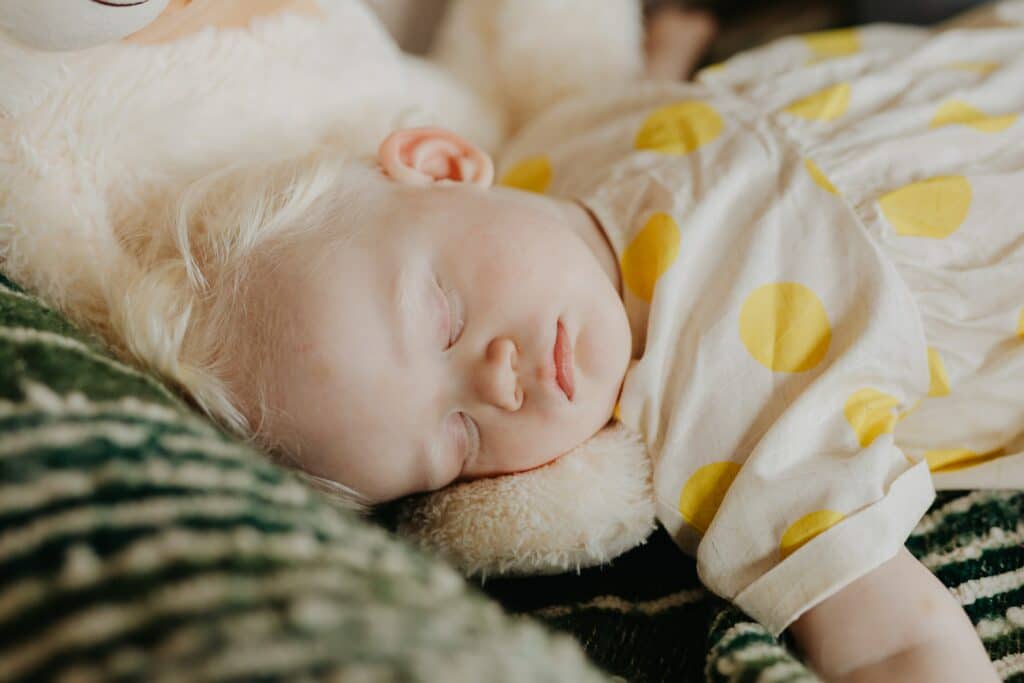
What if your baby’s breath stinks when they are sick?
Bad breath is not uncommon for people of all ages, especially when they’re sick and suffering from a cold, sinus infection, or sore throat.
The reason a sick baby’s breath may be unpleasant is that infected mucus drains to the back of the throat and stays there, causing the odor. These common illnesses can often make it hard to breathe normally, causing a dry mouth, which also leads to bad breath.
If baby is ill, offer plenty of liquids to help them get well and combat dry mouth and other bothersome symptoms.
Why does your baby’s breath stink no matter what you do?
Are stinky baby breath smells a chronic issue for your baby? Most of the time, if baby is not sick and there are no other obvious factors contributing to odor, good oral hygiene can clear up any unpleasant odors when it comes to baby’s breath. Most of the time, bad breath in children is caused by:
- Illness
- Mouth Breathing
- Medications
- Diet
- Oral infections
- Foreign objects or particles
- Poor Oral Hygiene
- Bacteria
- Dry Mouth
If chronic bad breath is an issue and your child’s dentist has determined that your child’s mouth is otherwise healthy, it may be time to head to the pediatrician for further health assessments. Sometimes chronic bad breath can be a signal something else is wrong and it’s important to identify what the issue is.
Conclusion
Keeping baby healthy is a full-time job and their oral healthcare is no different! Beginning early, remaining consistent, and keeping up with regular checkups can help prevent oral healthcare issues, like occasional bad breath, from happening.
However, sometimes bad breath can occur despite our best efforts. In those cases, it’s important to pay attention to things like your child’s diet, symptoms of illness, behavior, and other factors that may indicate a trip to the doctor or dentist is necessary.

